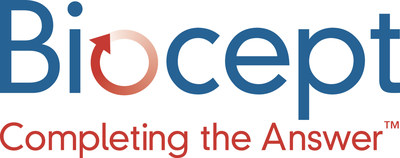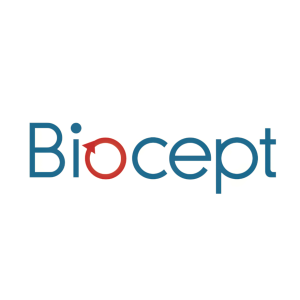Biocept Announces the Award of Japanese Patent for Primer-Switch Mutation Detection and Amplification Improvement Platform Used to Detect Rare Cell Mutations in Tissue, Blood and Cerebrospinal Fluid
Biocept, Inc. (Nasdaq: BIOC) has been awarded Japanese Patent No. 6734887 for its innovative Primer-Switch technology, aimed at detecting rare mutations and cancer biomarkers from circulating tumor DNA (ctDNA) via PCR analysis and next-generation sequencing (NGS). This patent is the third issued for the technology, enhancing Biocept's intellectual property portfolio and differentiating it within the liquid biopsy market. The technology enables precise amplification of oncogene mutations, critical for patient management in oncology.
- Award of Japanese Patent No. 6734887 for Primer-Switch technology enhances intellectual property protection.
- Third patent issuance for Primer-Switch technology shows commitment to innovation.
- Enhances specificity and performance of PCR, widely used in molecular diagnostics.
- None.
Insights
Analyzing...
SAN DIEGO, Sept. 23, 2020 /PRNewswire/ -- Biocept, Inc. (Nasdaq: BIOC), a leading commercial provider of liquid biopsy tests designed to provide physicians with clinically actionable information to improve the outcomes of patients, announces the award of Japanese Patent No. 6734887, entitled METHODS FOR DETECTING NUCLEIC ACID SEQUENCE VARIANTS. The patent provides intellectual property protection for the Primer-Switch technology, which is useful for the detection of rare mutations, including cancer biomarkers, found in tissue, blood and cerebrospinal fluid using circulating tumor DNA (ctDNA) analysis through real-time PCR and associated analysis methods, including next-generation sequencing (NGS).
This is the third issued patent for the Primer-Switch technology as Biocept pursues worldwide patent protection for this technology. The Primer-Switch technology provides a method for specifically enriching patient specimens for oncogene mutations of interest. Additionally, the Primer-Switch technology can be used to enhance the performance and specificity of the PCR method, which is the most widely used amplification approach in research and molecular diagnostics, including clinical applications. Biocept holds certain rights to the Primer-Switch technology within the field of clinical oncology.
"The Primer-Switch detection and amplification platform has the potential to find rare mutations in PCR reactions, which is highly useful when there is a need to detect rare genetic events or when more precise PCR amplification reactions are desired or required," Michael Nall, Biocept's President and CEO. "This technology builds upon the ability to detect rare genetic events which is the key target in our Target Selector™ ctDNA assays. We continue to expand our intellectual property portfolio to protect this method that differentiates Biocept from others in the liquid biopsy space."
About Biocept
Biocept, Inc. is a molecular diagnostics company with commercialized assays for lung, breast, gastric, colorectal and prostate cancers, and melanoma. The Company uses its proprietary liquid biopsy technology to provide physicians with clinically actionable information for treating and monitoring patients diagnosed with cancer. The Company's patented Target Selector™ liquid biopsy technology platform captures and analyzes tumor-associated molecular markers in both circulating tumor cells (CTCs) and in circulating tumor DNA (ctDNA). With thousands of tests performed, the platform has demonstrated the ability to identify cancer mutations and alterations to inform physicians about a patient's disease and therapeutic options. In addition, Biocept recently added COVID-19 testing to support efforts to fight the pandemic. For additional information, please visit www.biocept.com.
Forward-Looking Statements Disclaimer Statement
This release contains forward-looking statements that are based upon current expectations or beliefs, as well as a number of assumptions about future events. Although we believe that the expectations reflected in the forward-looking statements and the assumptions upon which they are based are reasonable, we can give no assurance that such expectations and assumptions will prove to have been correct. Forward-looking statements are generally identifiable by the use of words like "may," "will," "should," "could," "expect," "anticipate," "estimate," "believe," "intend," or "project" or the negative of these words or other variations on these words or comparable terminology. To the extent that statements in this release are not strictly historical, including without limitation statements as to our ability to improve the outcomes of patients diagnosed with cancer, and the utility and effectiveness of our intellectual property protections, such statements are forward-looking, and are made pursuant to the safe harbor provisions of the Private Securities Litigation Reform Act of 1995. The reader is cautioned not to put undue reliance on these forward-looking statements, as these statements are subject to numerous risk factors as set forth in our Securities and Exchange Commission (SEC) filings. The effects of such risks and uncertainties could cause actual results to differ materially from the forward-looking statements contained in this release. We do not plan to update any such forward-looking statements and expressly disclaim any duty to update the information contained in this press release except as required by law. Readers are advised to review our filings with the SEC, which can be accessed over the Internet at the SEC's website located at http://www.sec.gov/.
Investor Contact:
LHA Investor Relations
Jody Cain
Jcain@lhai.com
310-691-7100
![]() View original content to download multimedia:http://www.prnewswire.com/news-releases/biocept-announces-the-award-of-japanese-patent-for-primer-switch-mutation-detection-and-amplification-improvement-platform-used-to-detect-rare-cell-mutations-in-tissue-blood-and-cerebrospinal-fluid-301136389.html
View original content to download multimedia:http://www.prnewswire.com/news-releases/biocept-announces-the-award-of-japanese-patent-for-primer-switch-mutation-detection-and-amplification-improvement-platform-used-to-detect-rare-cell-mutations-in-tissue-blood-and-cerebrospinal-fluid-301136389.html
SOURCE Biocept, Inc.








